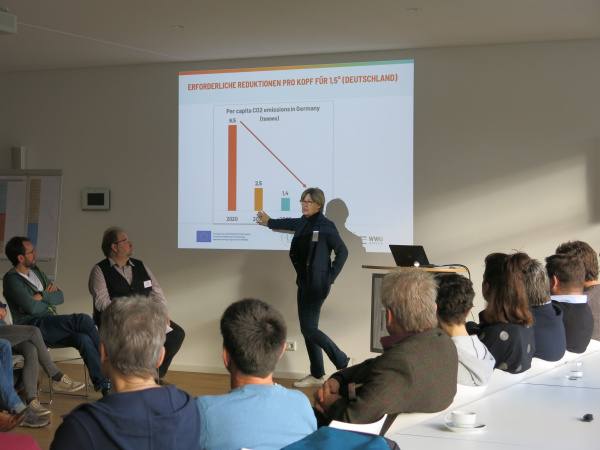
New research in five EU countries reveals stakeholders’ views on what is needed to enable a shift towards 1.5 °C-compatible lifestyles
PRESS RELEASE
11th March 2023
Bans and taxes for unsustainable behaviour and outcomes, positive incentives for low-carbon attitudes, and better public funding for basic services, are seen as essential climate policies to overcome current barriers to action at the household level - according to the research project EU 1.5° Lifestyles.
This analysis is built on previous work by the same project, which highlighted the seven most impactful barriers and enablers of 1.5° lifestyles, including the “economic growth paradigm”, the “systematic influence of vested interests”, and “inequity”.
Through five participatory Stakeholder Thinking Labs in Germany, Hungary, Latvia, Spain and Sweden, representatives from business, policymaking, media, civil society, think tanks and academia were asked how to overcome or strengthen the deep societal structures, which have inhibited action on the multiple environmental crises until now.
Taxes and bans were by far the most popular steps considered by the participants, including bans or heavy taxes on aviation, bans on driving in inner cities or districts, bans or taxes on sugar and other foods, as well as bans or taxes on other unwanted or unsustainable consumption behaviours, amongst others.
“This shows, perhaps, that such strong interventions are more acceptable amongst stakeholders than typically considered in the political realm, where such suggestions would be met with doubts regarding the feasibility of their adoption and implementation”, considers Doris Fuchs, project coordinator and Professor at the University of Münster.
The labs were designed around a Climate Puzzle and a backcasting method, to elicit original and out-of-the-box thinking. Participants were encouraged to think back from an imagined, positive, 1.5°-lifestyle future in 2040, assessing which steps were taken to change each of the 7 key structures, within multiple policy levels (locally, at the state level, and the supra-national level) and in terms of short, medium and long-term governance timeframes.
“A key question across the workshops was how to overcome a narrow, silo-focus in policymaking, seeing consumption across multiple fields as a whole”, adds Professor Doris Fuchs, noting that “planning and public policy that considers multiple needs at the same time (like housing, mobility, nutrition, and leisure) can ensure a more sustainable and fair outcome across consumption fields”.
The outcomes of the first round of Stakeholder Thinking Labs will provide inputs for upcoming research in the scope of the EU 1.5° Lifestyles project, including a second round of Citizen Thinking Labs, an EU-level policy Stakeholder Thinking Lab, a second round of Stakeholder Thinking Labs, and ongoing work on business models and the welfare state.
All project reports and outputs are available online.
CONTACT
Project Lead:
Prof. Doris Fuchs, Project Coordinator and Professor at WWU: doris.fuchs@uni-muenster.de,
Mobile: +49 176 52231089
HIGH-QUALITY IMAGES TO ILLUSTRATE THIS PR CAN BE FOUND HERE.
You can download the pdf of the Press Release here.
FURTHER PROJECT INFORMATION
The project’s main aim is to support the mainstreaming of low-carbon lifestyles in line with the aspirational 1.5 °C climate target and to facilitate the transformations sought by the Paris Agreement and the EU Green Deal. For this purpose, the project develops guidance for policymakers, intermediary actors and individuals based on scientific evidence on how lifestyle choices affect individual carbon footprints, and how political, economic, and social contexts enable or constrain shifts to sustainable lifestyle options.
The uniqueness of the project approach is that it recognises the important role of politics and policy in facilitating household and lifestyle changes. It demonstrates the potential contributions of individuals and households, and clearly articulates where limited agency by households requires structural changes and political and stakeholder intervention. In doing so, the EU 1.5° Lifestyles connects analyses of lifestyle perspectives at the household level in the four realms of nutrition, mobility, housing, and leisure with inquiries into relevant political, technological, economic and social structures at various levels of governance.
To mainstream 1.5 degrees lifestyles, the project develops practical recommendations, which can be integrated into everyday life and into EU and national policies. Along the way, the project provides stakeholders at national and EU levels with
- a quantification of climate and health impacts on shifting lifestyles in the EU and within three additional G20 countries (Indonesia, South Africa, Mexico);
- an overview of potentials for and barriers to change at the household level, including options for transitioning to 1.5 degrees lifestyles as well as associated potential risks and opportunities;
- an assessment of structural barriers and enablers for systemic transformations necessary for 1.5 degrees lifestyles;
- assessments of scenarios for economic and welfare systems, and business models compatible with 1.5 degrees lifestyles.
Several stakeholder workshops are held to co-produce outputs and involve target group members, and informational communication materials are disseminated, including concrete guidance for both citizens and decision-makers on transitioning to 1.5 degrees lifestyles.

